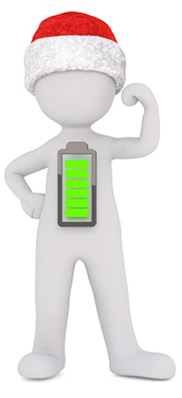Many psychologists talk to their clients about an emotional bank account: we only have so much in our bank account and the more emotions we extend to external sources (e.g. towards our spouse, children, friends), the less we have to care for ourselves. One of the lesser-discussed concepts is an energy bank account. Everyone only has so much time and energy to devote to our day and, let’s face it, there are many things in our lives that take energy: getting out of bed when anticipating a busy day, remembering to pay our bills, being nice to the difficult co-worker, standing in line 10 people deep at your favourite coffee shop, opening your email to 50 new messages, following through with commitments to others, saying “no” to your child, saying “yes” to your child, …the list goes on.
 But what is it that we do to refill our energy? Sleep, nutrition, and exercise are important components of refuelling and re-energizing. They help our body and our mind operate at their peak and we are often encouraged to pay attention to these factors when we are not feeling our best. Another factor that I would encourage you to consider when feeling fatigued is an emotional factor. How engaged, interested, and fulfilled are you with your life? We all have aspects of our life that we’re not thrilled with (mine is cleaning) but do because we prefer the outcome. To get through these tasks, we tend to go through the motions so we don’t get caught up in how much we dislike the event. This disconnection from our life experiences tends to withdraw from our bank account.
But what is it that we do to refill our energy? Sleep, nutrition, and exercise are important components of refuelling and re-energizing. They help our body and our mind operate at their peak and we are often encouraged to pay attention to these factors when we are not feeling our best. Another factor that I would encourage you to consider when feeling fatigued is an emotional factor. How engaged, interested, and fulfilled are you with your life? We all have aspects of our life that we’re not thrilled with (mine is cleaning) but do because we prefer the outcome. To get through these tasks, we tend to go through the motions so we don’t get caught up in how much we dislike the event. This disconnection from our life experiences tends to withdraw from our bank account.
So how do we make a deposit into this energy bank account so that we don’t end up in the red? We connect with the parts of our lives that we find enjoyable and satisfying. Once I finish with the unfavourable task of cleaning, I might take a moment to feel satisfied with a clean home instead of simply moving on to the next thing.
Alternatively, we may need to make small pockets of time for the things that rejuvenate us. Here are some ideas to consider, though the most relevant and valuable ideas will typically come from your own life and experiences:
- Take time for just you. We are very good at sacrificing time for ourselves. Commit some time (maybe fvie minutes, maybe an hour) to do something good for yourself that will leave you feeling energized. Organize your books by size or colour, meditate, watch a YouTube video, send a message to a friend you’ve been missing, or even buy a new toothbrush. Sometimes the small things can make a big difference when done consistently.
- What did you do for fun as a child? When I was younger, I spent much of my free time drawing, colouring, and painting. Today, I derive energy from painting and from adult colouring books. Think back to when you were a child: was there an activity that you did then that might be adapted to be fulfilling to you now? Perhaps it was a game of basketball, riding your bike, playing an instrument, or board games with friends?
- Do something kind for someone else. There are many benefits for meeting our own needs, but these benefits can double if we care for someone else’s needs. Sending flowers to a friend when he/she is sick or doing an unexpected favour for a loved one will not only make them happy but also allow us to see them happy and feel good for having contributed.
For an interesting article about how fatigue can manifest psychologically (and also be addressed psychologically), check this one out: http://www.goodtherapy.org/blog/dear-gt/why-am-i-always-tired.
